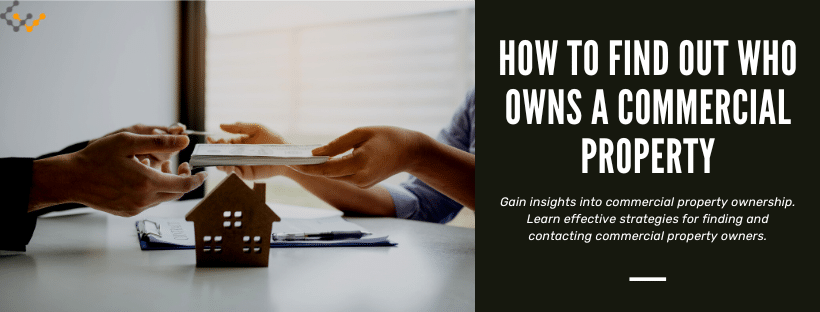How to Find Out Who Owns a Commercial Property

The best commercial real estate opportunities often aren’t listed. They require research to find, and a key component of the research is finding out who owns the property. Rarely is this easy to do, but several strategies can be used to figure out who you should contact about potentially purchasing a commercial property.
Understanding Commercial Property Ownership
Finding who owns a commercial property is more involved than simply looking up tax records to see who owns a residential home. Commercial properties are rarely owned by individuals, but rather by partnerships, limited liability corporations, other corporations or trusts.
In many cases, these legal entities were specifically created for owning the property. Thus, there are scant details about the company.
Analyzing Commercial Property Opportunities
Because researching ownership can be involved and require fees, it’s important to first identify potential properties. Any property you check the ownership of should fit with your investment goals, strategy, and portfolio. It also should be a promising opportunity.
Property screeners can sort potential properties by building type, location, estimated price, and many other details. It’s important to use a screener that doesn’t just check listed properties, though.
In many cases, however, the best opportunities are found through knowing the market and its players. Working with a commercial real estate agent, simply being aware of properties in the local area, and networking with others may help you discover opportunities. Other real estate investors, surveyors, contractors and others might learn of a potential property before it’s actually listed.
How to Find Commercial Property Owners: 7 Ways
Many strategies can reveal who owns a commercial property. Unless you already have a subscription to an online database, start with the first method listed. Proceed down the list of ways to find commercial property owners as needed, until you identify the owner.
1. Tax Records
Local property tax records are publicly available in all jurisdictions, and usually free to check. Municipality and county tax records can usually be checked online, although some local government websites are easier to navigate than others. Contact the tax assessor directly if you can’t find a record online.
Most of the time tax records will only indicate an opaque entity, such as an LLC or partnership. Occasionally, they might show an individual owner whom you can contact directly. Individuals can usually be looked up fairly easily via online services.
Assuming it’s a more opaque legal entity, you might have success checking the state or county records for a registered agent. The registered agent is who you should officially send communications to. Sometimes this is the property owner or a partner themselves. Other times, it’s a registered agent service.
2. Other Public Records
If tax records don’t help you identify who owns a property, the next step is to check other local public records. This is less likely to give you actionable ownership information, but it’s easy to contact a municipal clerk and county clerk to check. If they don’t have any information, then you’re unlikely to find anything by continuing to look for official public records.
3. News Articles
A quick search of news articles might yield information that’s not in official records. It’s easy to search online for new articles using the exact address. A brief newspaper article might list the entity that purchased a property, and likely the name of a partner or CEO. An old PR release could even list contact information for the owner.
As with other public records, this is unlikely to be extremely useful but easy to check.
4. Networking Connections
Don’t neglect to simply ask your connections in the local area. A real estate agent, investor, contractor or business owner might happen to know who owns a specific property. Even a longtime resident could remember who purchased a property or what business used to be located at it.
5. Online Tools
When other methods don’t yield results, several online property search tools are available for finding out who owns a property.
Reonomy is one such tool, providing details including ownership information, sales history, financing history, building-level specs, and more. Properties can be searched by address, or screeners based on location, asset type, zoning, property sizes, and similar details can be used. Other similar services include:
- ProspectNow
- CoStar
- Reonomy
- Crexi
- PropertyShark
- DataMasters
6. Title Company
A title company can often look up ownership information. The information a title company gets may not be as complete as an online tool, though, and title companies typically charge higher fees.
7. Real Estate Attorney
You’ll be able to find ownership information via at least one of the aforementioned methods. For especially oblique properties, however, a real estate attorney can be consulted.
Information You Need to Facilitate Your Search
An address is usually all that’s required to check property ownership. If you’re searching for potential properties, criteria such as location, building type, size, zoning and similar details should be used. The more criteria you have, the more applicable your search results will be.
How to Contact Commercial Property Owners
Once you’ve identified the owner, the next step is to establish contact.
If you obtained the owner’s details through public records or an online database, you might already have their contact information. If the property is owned by a company or legal entity, further investigation might be needed to find the appropriate contact person. Checking the registered agent is a good start. When all else fails, you can try sending a letter to the actual address and see whether there’s a reply.
When reaching out, be professional and clear about your intentions. Send something that’s clear and concise, and let the owner follow up if they’re interested. You might inquire in a few weeks to confirm that your first communication was received.
While email is convenient, a letter or phone call can be more effective. These other options will ensure your email isn’t discarded as spam or a scam.
Wrapping Up
If you’ve identified a potential commercial property to acquire, take these steps to find out who owns it. An inquiry is well worth making if you think the property could be a promising opportunity. This is commercial real estate at a more advanced, and perhaps more profitable, level.

